

Digital Literacy. Intro Lessons. In this sequence of introductory lessons, we present students with an imagined scenario: their school board is weighing whether to make Saturday school mandatory for everyone, and they want to hear students’ opinions on the proposed policy.
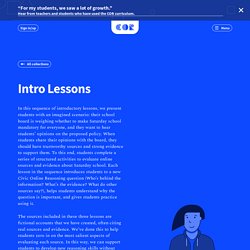
When students share their opinions with the board, they should have trustworthy sources and strong evidence to support them. To this end, students complete a series of structured activities to evaluate online sources and evidence about Saturday school. Each lesson in the sequence introduces students to a new Civic Online Reasoning question (Who’s behind the information? Evaluating the Trustworthiness of Online Sources. Snopes.com - The definitive fact-checking site and reference source for urban legends, folklore, myths, rumors, and misinformation.
Is It Real? Using Reverse Image Search. Lesson of the Day: ‘6 Google Tricks That Will Turn You Into an Internet Detective’ Find all our Lessons of the Day here.
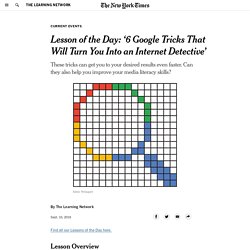
Featured Article: “6 Google Tricks That Will Turn You Into an Internet Detective” (available here as a PDF) We chose this article, from The New York Times’s Smarter Living section, not only because it offers practical tips anyone can use, but also because understanding how to search the internet for information is an essential media literacy skill. The questions and activities below aim to help students understand why and how to do better Google searches, but also weave in ways to apply the information and practice on their own. What tricks do you already know for using Google, or any search engine, efficiently? For example, how would you find the lyrics to Taylor Swift’s song “Shake It Off” as quickly as possible? Read the related article and answer the questions below. 1. 2. 3. Source (K-12) The One-stop Instruction Platform for Preparing Students for College-level Research Students today are asked to navigate a complex world of digital information, however many struggle to search effectively, evaluate sources, and communicate their findings.
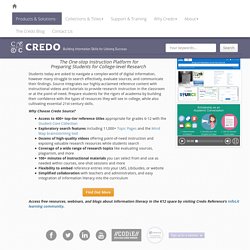
Source integrates our highly-acclaimed reference content with instructional videos and tutorials to provide research instruction in the classroom or at the point-of-need. Prepare students for the rigors of academia by building their confidence with the types of resources they will see in college, while also cultivating essential 21st-century skills. Why Choose Credo Source? IL for Secondary Ed. Increase college readiness through Credo’s innovative partnerships with post-secondary institutions and local high schools Through the Building Bridges program, Credo helps post-secondary institutions to provide select local high schools with Source, Credo’s skill-building exploratory research platform.
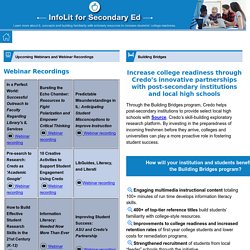
By investing in the preparedness of incoming freshmen before they arrive, colleges and universities can play a more proactive role in fostering student success. Engaging multimedia instructional content totaling 100+ minutes of run time develops information literacy skills. 400+ of top-tier reference titles build students’ familiarity with college-style resources. Framework for Information Literacy for Higher Education. Filed by the ACRL Board on February 2, 2015.
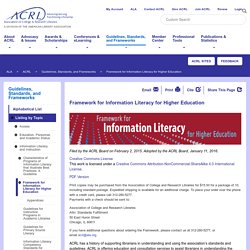
Adopted by the ACRL Board, January 11, 2016. This work is licensed under a Creative Commons Attribution-NonCommercial-ShareAlike 4.0 International License. PDF Version. School Library Journal. The 24th annual World Book and Copyright Day celebrates reading around the world and the contributions of books as an ally in education and the progress of humanity.
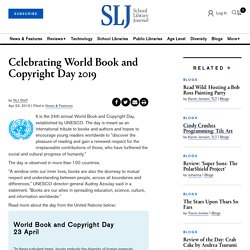
It is the 24th annual World Book and Copyright Day, established by UNESCO. The day is meant as an international tribute to books and authors and hopes to encourage young readers worldwide to "discover the pleasure of reading and gain a renewed respect for the irreplaceable contributions of those, who have furthered the social and cultural progress of humanity. " The day is observed in more than 100 countries. Digital literacy. 1 Introduction Digital literacy is the “ability to access, process, understand and create information or media content in the digital environment” (Hsieh, 2012). [1]).
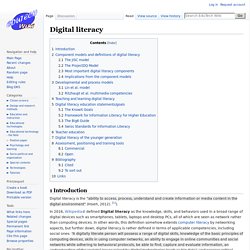
In 2016, Wikipedia defined Digital literacy as the knowledge, skills, and behaviors used in a broad range of digital devices such as smartphones, tablets, laptops and desktop PCs, all of which are seen as network rather than computing devices. In 2011, Wikipedia defined Digital literacy as “the ability to locate, organize, understand, evaluate, and analyze information using digital technology. Digital Literacy. US Digital Literacy. Digital Literacy. Google.com/url?sa=t&rct=j&q=&esrc=s&source=web&cd=16&cad=rja&uact=8&ved=2ahUKEwjc0vzRiJvgAhWqIDQIHesiC3AQFjAPegQIARAB&url=https%3A%2F%2Fwww.microsoft.com%2Fen-us%2Fdigitalliteracy%2Fhome&usg=AOvVaw0OWFV2gNN-L69gp0iQ2vKw. What is Digital Literacy? Every educator is familiar with the concept of literacy—the ability to read and write.
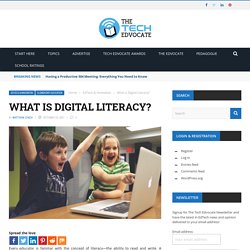
A person who is illiterate, who cannot read or write, will inevitably struggle to get along in society. It’s impossible to go on to higher education or get a high-paying job without the ability to read and write. Even daily tasks, like reading a newspaper or filling out job applications, are difficult for an illiterate person. Digitalliteracy.gov. What Is Digital Literacy? Ava reads at Indian Run Elementary School in Dublin, Ohio. The school integrates iPads, laptops, and books into reading time. —Maddie McGarvey for Education Week Digital Literacy: An Evolving Definition While the word "literacy" alone generally refers to reading and writing skills, when you tack on the word "digital" before it, the term encompasses much, much more. Sure, reading and writing are still very much at the heart of digital literacy. What is digital literacy? S.U.R.E.’s “Real or Fake” quiz game.
We recently developed a quiz game for the Google Assistant platform called “Real or Fake”.
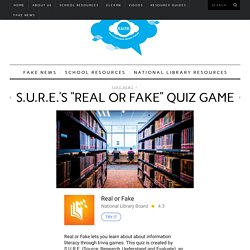
Using voice commands or text inputs, players can guess if the featured news headlines were real or fake. Our quiz was reviewed in the 26 June 2018 edition of InformationToday Europe: “Real or Fake – a lot of libraries now consider themselves an active player in the fight against Fake news. The National Library Board in Singapore does this with the S.U.R.E (Source, Research, Understand and Evaluate) campaign (an initiative by the National Library Board) and has a game on Google Assistant for users to try their skills to determine if a piece of news headline is Fake news or not.
It’s a simple game, you get to choose either local news or international news. Comments are closed.